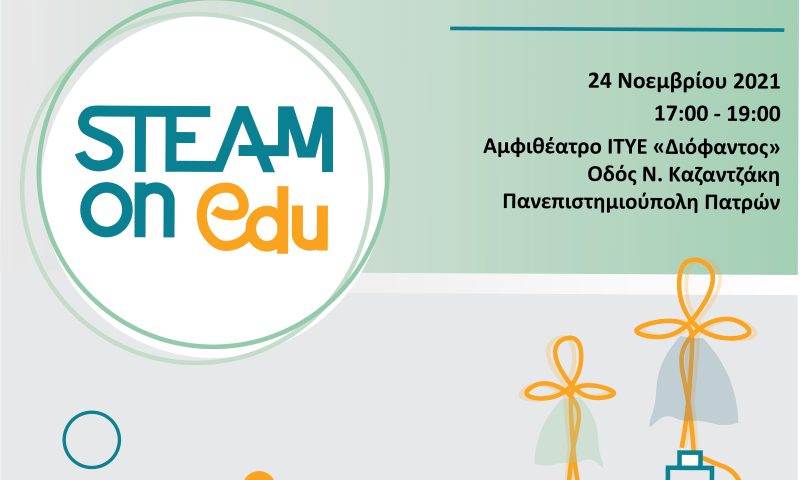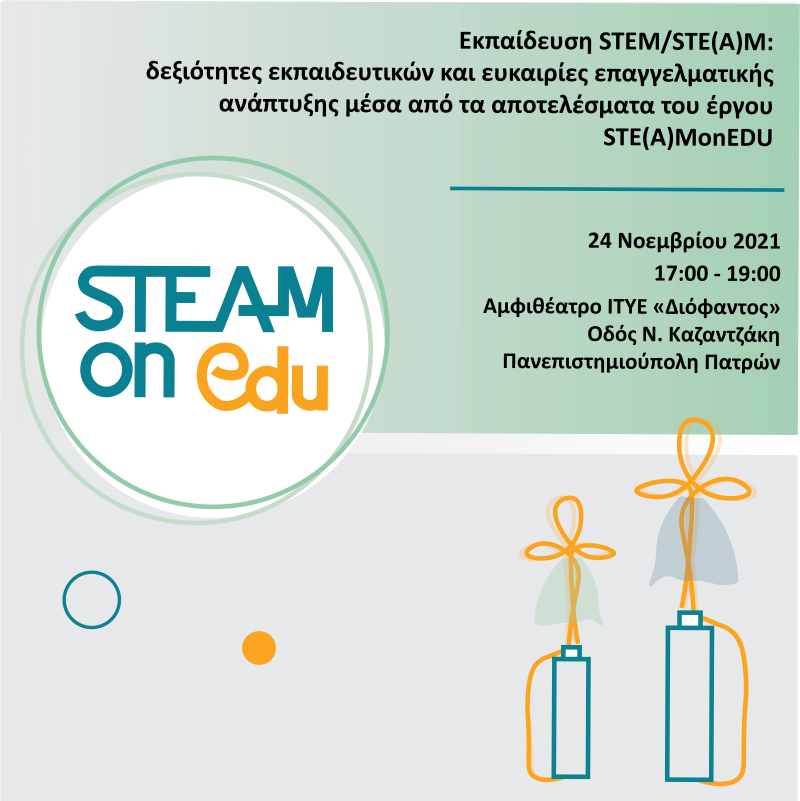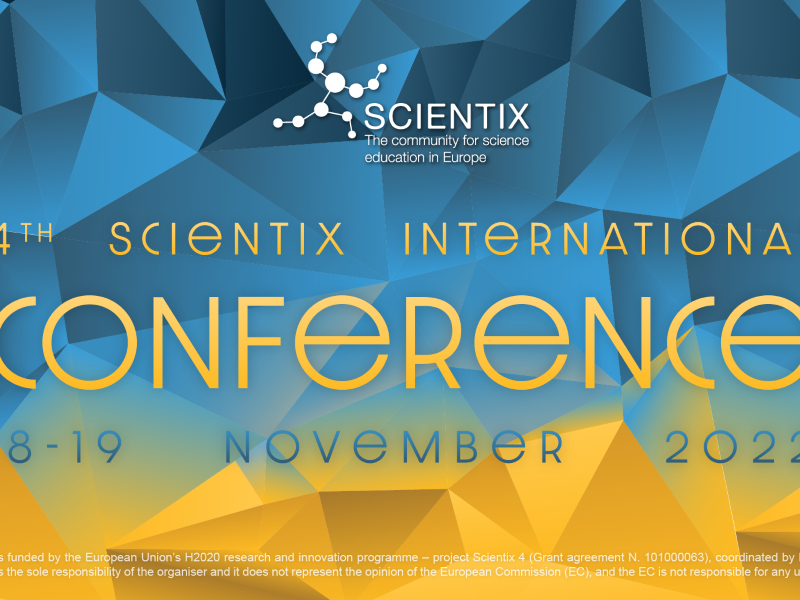National event on “STEM/STEAM education: educators’ competences and professional development opportunities through the outcomes of project STEAMonEdu”
National event on “STEM/STEAM education: educators’ competences and professional development opportunities through the outcomes of project STEAMonEdu”

24 November 2021, 17:00-19:00
Amphitheater of Computer Technology Institute and Press “Diophantus”
Kazantzakis street, University of Patras campus
Recent European Commission policies (i.e. European Skills Agenda, European Education Area and Digital Education Action Plan) call for a holistic approach to competence development, which combines “soft” skills (including digital skills, green skills, entrepreneurial skills, life skills) with “hard” skills (thorough domain knowledge combined with practical skills). Then it comes as no surprise that they strongly advocate the need for widespread adoption of STEM education, as this is the most promising candidate teaching approach that enables students integrate of all the above competences.
The STEM (and more recently, STEAM) education approach is radically different in focus, content and method from prevailing educational approaches. STEM/STEAM education highlights the key role of science and computational thinking, integrates research and engineering with creativity, relies heavily on modern technology and is tightly associated with real-life issues. Consequently, it seems that the adoption of STEM/STEAM education will require a paradigm shift in educational practice which in turn will require a change in mindsets.
Teachers and educators are once again invited to play a key role in this transformation. They are the ones who will be called to implement in the classroom the new education policies and put in practical use the STEM/STEAM education approach. Its wide adoption depends on their successful performance. Therefore, investing in their professional development via initial or lifelong learning becomes a key success factor.
Project STEAMonEdu contributed to innovative and cross-disciplinary approaches in implementing STEAM education by revising and strengthening the professional profile of the teaching profession. As a result, the project created a solid interdisciplinary base for developing STEAM related competences. The project integrated three different aspects:
- Community: Teachers and educators are given a central role as members of an online community supported by an online platform that provides access to a repository of material and best practices and allows discussions that facilitate peer learning
- Identity: Identification of the roles and competences involved in applying STEAM as an educational practice, production of the first STEAM educator competence framework, design of the STEAM educator profile and development of a self-assessment tool
- Development: Professional development of teachers and educators via MOOC and blended learning course
The DAISSy research group of Computer Technology Institute and Press “Diophantus” in collaboration with RDEWG organize an event to present the achievements of STEAMonEdu project. The event will take place on Wednesday 24 November 2021 at the amphitheater of CTI, in Patras, Greece. Because of the current situation, participation via Zoom will also be possible via the link.
The event is addressed to teachers and trainers, who are interested in practicing STEM/STEAM education, as well as education and training organizations, researchers in educational methods and techniques, educational authorities and policy makers and other stakeholders (e.g. career consultants).
Participation is free. Certificates of attendance will be awarded to those who will register and attend. You can register by following the link.
Read the programme
17:00 - 17:05 Καλωσόρισμα - επισκόπηση έργου (Α. Καμέας, Καθηγητής ΕΑΠ, Επιστ. Υπεύθυνος έργου)
17:05 - 17:20 Πλαίσιο Ικανοτήτων Εκπαιδευτών STE(A)M και εργαλείο αυτο-αξιολόγησης STE(A)M (Ν. Σπυροπούλου, ερευνήτρια έργου)
17:20 - 17:40 Το εκπαιδευτικό πρόγραμμα του έργου STE(A)MonEdu (Α. Ιωσηφίδης, Καθηγητής Διεθνούς Πανεπιστημίου)
17:40 - 17:50 Πλατφόρμα υποστήριξης κοινότητας (Ι. Καλέμης, μέλος ομάδας έργου)
17:50 - 18:15 Παρουσίαση 3 επιλεγμένων καλών πρακτικών που έχουν εφαρμοστεί στην τάξη
1η Πρακτική (Νηπιαγωγείο): Παραμυθένια μαθηματικά / Fairytale Mathematics
Παγανιά Γεωργία, Κατερίνα Γαστεράτου, Παναγιώτης Παπαδουρης (link)
2η Πρακτική (Δημοτικό): Μικρόβια δε σας φοβάμαι …τους κανόνες πρόληψης πάντα θυμάμαι!
Αικατερίνη Nικολακοπούλου & Αικατερίνη Nάστου (link)
3η Πρακτική (Γυμνάσιο): "Όταν ο ήλιος είναι πιο ψηλά ... της Γης την περίμετρο μετρά". Το πείραμα του Ερατοσθένη στο ΠΓΠΠ."
Αθανασία Μπαλωμένου ΣΕΕ ΠΕ03, Βασιλική Ρήγα, ΠΕ03,ΠΓΠΠ
Σπυριδούλα Σουλιώτη ΠΕ03, 3ο Εσπερινό ΕΠΑΛ, Παρασκευή Πούλου ΠΕ04.04, ΠΓΠΠ
Λαμπρινή Βουτσινά ΠΕ04.01, ΠΓΠΠ (link)
18:15 - 18:45 Συγγραφή STEAM Σεναρίων με βάση templates στο LAMS (Δρ. Σ. Παπαδάκης, Σ.Ε.Ε. ΠΕ86, ΠΕΚΕΣ Δυτ. Ελλάδος)
18:45 - 19:00 Συζήτηση και βιωσιμότητα (Α. Καμέας, Καθηγητής ΕΑΠ, Επιστ. Υπεύθυνος έργου)



